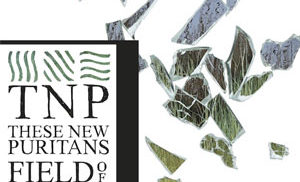Available on: Infectious LP
So then, fitting adjectives for These New Puritans’ utterly sublime third album? Let’s start with ‘unique’, and say that Field Of Reeds is that certainly that, most of all in terms of mood and tone, though not exclusively – it’s also successful in its bid to remain “reference-free” as main man Jack Barnett told FACT was his hope. Next, is the Essex band’s new outing ‘ground-breaking’? In the indie world, possibly, although in TNP’s chosen field here of ‘experimental orchestral’, possibly not – let’s face it, there’s a chance some conservatory-trained prog bassoonists were pushing this particular envelope a decade ago. And, finally, the big daddy in the big book of critical superlatives, is the album a work of ‘genius’? Well there’s an argument for and against that one, but feel free to chew it over on your own buck.
There’s one adjective that fits Field of Reeds more than any other, and that is ‘beautiful’. It’s really, really beautiful – beauty as it should be in music: something precious, elusive and exotic, or indeterminate, a little sad and more than a little elegant. Field of Reeds’ strain of beauty is all these things, but then these are just words, when what you really need is colours, or sensations, to properly convey the painterly nuances of Barnett’s et al’s strange and fecund prettiness. It’s in evidence right from the album’s opening bars, as a pendulous two-note piano swings back and forth like a hand lapping warm shallows on the riverside – and an undine Elisa Rodrigues coos over crescendoing English noir trumpet. It puts the workaday Waitrose beauty of Coldplay to absolute shame.
With the possible exception of lead single ‘Fragment Two’, every single track here is profoundly good, and in the case of ‘Dream’ and ‘The Light In Your Name’, astonishing. Sung by a bewitched Rodrigues, the former converts an ocean of sustained but precarious calm into a uncomfortable finale that recalls a muted version of Scott Walker’s cymbal-pounding ‘Clara’. First there’s xylophones and clarinet and everything is right in the world. Next it’s midnight in the garden and all the marble-eyed cherubim are coming to life. ‘The Light In Your Name’, meanwhile, offers a remarkable journey, as four minutes of expertly controlled build and heavy tension gives way to waves of cascading unbehagen before finally expiring in a cloud of brassy squall, martial drums and weeping vocals. It’s hard to believe that not five years ago These New Puritans were nothing more than a jagged guitar band.
The four-piece are often classified as ‘post-rock’, and indeed, Graham Sutton of pioneering post-rock act Bark Psychosis returns once again to produce, while the new addition of trumpets to TNP’s palate seems directly influenced by Sutton’s ’80s material (the only evidence of an overt reference point on the album). Parallels can also be made with the millennium’s archetypal post-rock album, Kid A, in the sparingly used flecks of skittery, spidery electronica. Like Sutton, Barnett is a superbly skilled texturologist, blending the organic/acoustic and machine-made in such a manner that avoids dislocation but retains a componential tension; the image conjured being of a placid bucolic setting – the titular field of reeds – fast vanishing into the anxious grips of ashen backdrop of British industry. On the remarkable ‘Organ Eternal’, although the lead sequencer loop is vaguely redolent of ’90s pop-trance, the electronic settings on the part is such that, although it sounds unnatural within the greater soundscape, it intertwines seamlessly with the double bass, strings and cymbal.
But rather than post-rock, it is English folk that Field Of Reeds more closely resembles, albeit English folk of panoramic grandeur, ornate in its elaborateness. There’s the implication of nature worship (recalling that other great post-punk naturist, Bjork), there’s the folk-leaning choice of instrumentation – woodwind and cello – and then there’s the added care Burnett says he took when composing his lyrics this time, putting the onus on story telling. The maths-themed lyrics of past TNPs have been replaced for the less abstract themes of human intimacy and, another TNP-first, love. Equally evident is the base commitment to the maudlin, almost macabre darkness peculiar to English folk – think Nick Drake and Cat Stevens, a medieval hangover of occult superstition rendered here by a well-exercised low end: the moaning cello, the doom-y piano notes, inky trumpet. In English folk the river is a central image, and sure enough the way Field of Reeds moves could be said to mirror the meandering journey of a languorous but inexorable stream.
The river in English folklore (and the attendant music) has always stood for the eternal infinite, and certainly, by the end you feel that Barnett and co have gone about as far as they are to go in this particular journey. The last thing you hear is a child, singing from beyond the warm light. The word is beautiful.

































